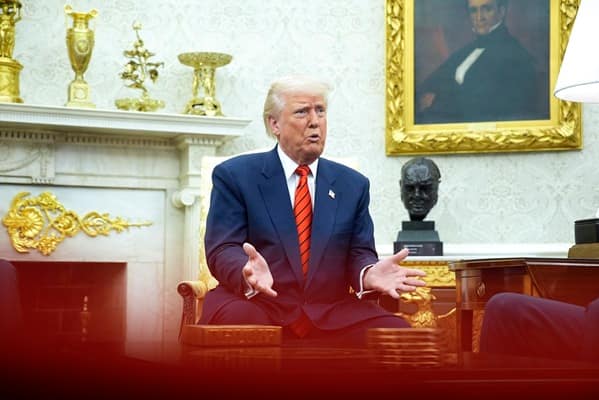A leading expert on U.K. and US business relations has delivered his analysis of President Trump’s first 100 days.
Reflecting on the opening months of Trump’s second term, business expert James Disney-May noted that policy decisions are already influencing the business dynamics underpinning Britain’s special relationship with America.
James said: “Donald Trump’s return to the White House has brought renewed focus to economic nationalism, energy independence, and regulatory reform. Within the first three months, the U.S. administration has introduced a 10% universal import tariff, announced the reduction of over 250,000 federal jobs, and declared a national energy emergency – moves that have injected both momentum and volatility into global markets.”
“These measures reflect a bold and fast-paced approach to governance, aimed at reshaping U.S. economic posture. However, the speed of execution has raised questions around long-term strategic planning and coordination with allies.”
“The implications for the United Kingdom are already emerging. As the U.S. pivots toward a more self-reliant stance, there’s fresh uncertainty for British trade ambitions, transatlantic investment flows, and shared defence commitments. It’s a moment that calls for pragmatism, adaptability, and clear diplomatic engagement.”
Here, James brings together five headline policies from the Trump administration and examines their ripple effects, particularly on the United Kingdom.
Tariff policy and economic volatility
Trump’s Tariff Take‑Turn: A Kettle of Hot Money?
President Trump’s new tariff plan fans up the heat on certain Chinese imports, with duties soaring as high as 145 % on a handful of goods. The pitch? Push American manufacturing homeward and punch a protective shield around U.S. industry. It might look good to local producers, but the early economic stats? They’re a mixed bag. U.S. GDP dips a cool 0.3 % in Q1, and worldwide markets are nudging back with caution, wary of the ripple effect.
UK Companies: Struggling to Keep Up in a Tightening Supply‑Chain Tango
For UK firms tangled in U.S. supply chains – think Jaguar, Land Rover, and the ever‑prestigious Rolls‑Royce – the tariffs are spilling over into higher costs and a new layer of complexity. It’s more than just a sticker price change; the entire trade structure is getting a makeover. The British automotive and aerospace giants are now juggling extra freight fees, delayed component flows, and the occasional phone‑call to the U.S. customs office in the middle of the night.
What’s at Stake for Britain?
- Recalibration for a more transactional U.S. relationship – tightening quotas, bolstering domestic manufacturing, and watching the ledger carefully.
- Branching out – looking to other markets, diversifying trade partners, and forming new alliances that might balance the load.
Either route calls for nimble moves from both government and industry, like a high‑speed chase scene where every second counts.
Government Efficiency, Elon Musk‑Style: A Big-Picture Shake‑Up
Enter the Department of Government Efficiency, under the leadership of none other than Elon Musk. The overhaul promises a staggering $160 Billion reduction in public spend, with thousands of roles cut. Musk’s vision: streamline bureaucracy, trim the surplus, and reallocate resources with robotic precision.
Is It a Business‑Style Power Move?
Adherents hail the initiative as a business‑like reset, taking the same ruthless efficiency tactics that make tech firms thrive and applying them to governance. The headline numbers are impressive, but the bigger question is: what happens to the institution’s long‑term chops?
The UK’s Takeaway
There’s a cautionary lesson tucked into Musk’s bold campaign. Cheap cuts can give a quick fiscal hit, but if you don’t preserve the institutional core, the system may lose long‑term capability. The mantra? “Efficiency must be earned, not declared.” The risk? If the optics of reform are slapped on without real substance, the entire approach can backfire – like a flashy stunt that ends up being a flop.
Bottom Line
As tariffs rise and bureaucratic shake‑ups continue, the UK faces a pivotal decision: either tighten its ties with the U.S. and beef up domestic prowess, or spread its wings and form new trade ties. Either way, agility, foresight, and a keen eye on efficiency – without cutting corners that hurt the long run – are the real winners in this grand economic drama.
Energy deregulation and strategic risks
“President Trump’s declaration of a national energy emergency has enabled the administration to expedite oil and gas permits by waiving certain environmental reviews. The result has been a sharp 20% drop in oil prices and a significant uptick in U.S. domestic production – moves that have been welcomed by some as a boost to energy independence and cost control.”
“However, the policy shift has sparked debate over regulatory oversight and long-term sustainability. While the economic benefits are clear in the short term, the sidelining of environmental protections introduces new strategic risks – particularly for allies with more climate-focused policy frameworks.”
“For the UK, the challenge lies in navigating a more commercially driven U.S. energy agenda without undermining its own environmental targets. As global energy dynamics become more fragmented, Britain may find itself needing to work harder to maintain credibility on climate diplomacy and ensure its values are reflected in future trade arrangements.”
Tax reform and worker spending power
“The Trump administration has proposed exempting federal income taxes on tips, overtime, and Social Security payments – an initiative aimed at increasing worker take-home pay and boosting consumer spending. Though still in the proposal stage, it reflects a broader effort to stimulate the economy through labour-driven fiscal incentives.”
“The political appeal of larger pay cheques is clear, especially in sectors like hospitality and retail. Yet the structural impact will hinge on the policy’s implementation – how it’s funded, and whether the additional income circulates through the economy or is saved.”
“In the UK, the idea has sparked renewed discussion around labour taxation, particularly in lower-paid, high-turnover sectors such as care and hospitality. While there’s interest in adopting similar incentives, experts caution against simple replication.”
“Context matters. The U.S. is leaning heavily on consumption to fuel growth. The UK, with its different tax structure and social safety net, would need to evaluate such policies carefully to avoid unintended fiscal or social consequences.”
Housing supply and public land debate
“President Trump’s proposal to open federal land for residential development is being positioned as a bold response to America’s housing shortage. The goal is to rapidly boost supply, reduce cost pressures, and drive construction-led economic growth.”
“The move signals a willingness to rethink federal land use policy, but turning available land into actual homes is rarely straightforward. The real challenge isn’t just land – it’s infrastructure, zoning, and delivery at the local level.”
“Britain faces similar hurdles. Despite years of policy focus on unlocking public land, progress has often been slow and fragmented. The UK experience underscores a key lesson for U.S. policymakers: headline-grabbing initiatives must be matched by long-term planning and local coordination, or they risk becoming symbolic rather than systemic solutions.”
Get real time update about this post category directly on your device, subscribe now.
Subscribe




